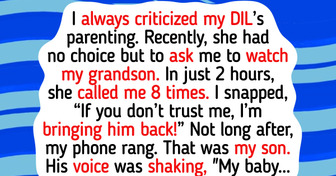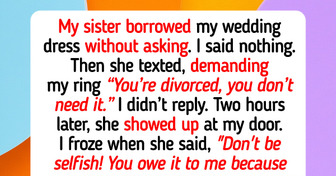you were 100% right in everything - including the way you felt and the way you conducted yourself!!
I Refuse to Be Humiliated Just Because I’m Poor

Money can often create tension in relationships, especially when it comes to family, gifts, and expectations. While some people are able to look past financial differences, others let money shape the way they treat those around them. These situations can lead to misunderstandings, hurt feelings, and difficult decisions. Recently, one of our readers sent us a letter about an experience that raises important questions about fairness, respect, and how far is too far when trying to make a point.
Dylan’s letter:
My in-laws gifted us a trip to Fiji to celebrate my wife’s 30th birthday. We got on the plane, and I realized that she and our son are booked first-class, and I’ll sit economy. She said, ’’Dad says that he’s not your ATM.’’ I just smiled and let it go.
But when we arrived in Fiji, things took a turn. My wife froze at the check-in desk—there was no reservation under our name. That’s because I had quietly canceled the 5-star hotel booking as soon as we landed and arranged for us to stay in a modest motel instead.
I turned to her and said, “If your dad isn’t my ATM, that’s fine. I paid for this motel myself. You’re my wife—you’ll have to deal with it.”
She looked stunned. For the next five days, she and our son kept complaining about how uncomfortable the place was. But I was perfectly fine. I’m tired of dealing with my spoiled wife and my in-laws’ snobby attitude.
Now, we’re back, but she still says I tuned her big birthday into a nightmare and that I had no right to “ruin” her parents’ gift.
Maybe I went too far. But all I wanted was to teach her a lesson. Was I wrong?
— Dylan

Hi Dylan! Thank you for sharing your story with us. We’ve prepared some guidance to support you as you work through this delicate situation.
Try a neutral third-party mediation with your wife.

I'd have gotten off of the plane, gone home and found somewhere to live and packed up my belongings. Your wife doesn't love or respect you. Long past time leave.
This situation clearly exposed deeper rifts—resentment, power imbalances, and communication gaps. A couples therapist or a mediator could help unpack why you felt the need to act out through the hotel swap, and why she felt entitled to fly first class without you.
It’s not about assigning blame, but understanding the underlying expectations and disappointments. A structured, neutral environment might be the only way either of you can really express and hear what’s been building up.
Consider having a direct conversation with your father-in-law.

You mentioned he said, “I’m not your ATM,” which your wife quoted. This suggests he’s involved in your relationship in a way that affects your dignity. Instead of retaliating through your wife, go directly to the source.
Request a calm, one-on-one conversation with him and say, “I heard what you said through your daughter. I want to understand if there’s a problem between us.” This may seem bold, but confronting the root of the snobbish attitude might be more productive than expressing your frustration through symbolic gestures.
Own your part—without self-blame, but with clarity.
Regardless of intention, you made a unilateral decision to cancel the hotel, and your wife and child paid for it emotionally. Even if you felt justified, you did it to teach a lesson—not to resolve a problem.
You could tell her, “I felt humiliated on that plane and silenced at every turn. I wanted you to understand how it feels to be excluded. But I get that I ruined your birthday in the process, and that wasn’t fair. I should have handled it differently.” This won’t excuse her behavior, but it may reopen respectful dialogue.
Reframe what the trip revealed about your marriage.
Forget the Fiji logistics—look at what this situation exposed: different values, unresolved resentment, and uneven partnership. Ask yourself: “Do I feel like an equal in this marriage?” If the answer is “no,” this isn’t about one birthday trip—it’s about needing a complete reset in how you and your wife relate, communicate, and make decisions.
Consider stepping away emotionally for a bit (e.g. a weekend alone) to think about what you want your marriage to look like, and whether both of you are willing to rebuild from this.
Diana is another Bright Side reader who recently shared her story with us. Her husband had excluded her teenage daughter from Diana’s birthday celebration, sparking a lot of debate. You can read her story here.
Comments
Related Reads
My Son Gave Up His Family to Chase a New Life, So I Gave Him a Harsh Dose of Reality

14 True Stories That Could Hit Google’s Front Page

12 Nightmare Bosses Who Could Easily Star in the Next Office Drama

18 Stories About Family Members Who Can Make You Want to Live on Another Planet

My Husband Insisted I Put My Gravely Ill Mom in a Nursing Home, I Made Him Taste His Own Medicine

16 People Who Lucked Out When They Needed It the Most

I Banned My Niece From My House—Now Everyone Thinks I’m the Villain

10 Moments Where Kindness Didn’t Argue—It Acted

I Refused to Babysit Under My DIL’s Rules—I’m Not “Learning” How to Be a Mom

15 Stories That Prove Some Memories Are Impossible to Delete

I Refused to Watch My DIL Give Birth— She Made Sure I Regretted That Moment

12 Stories That Prove Kindness Is the Strongest Armor


